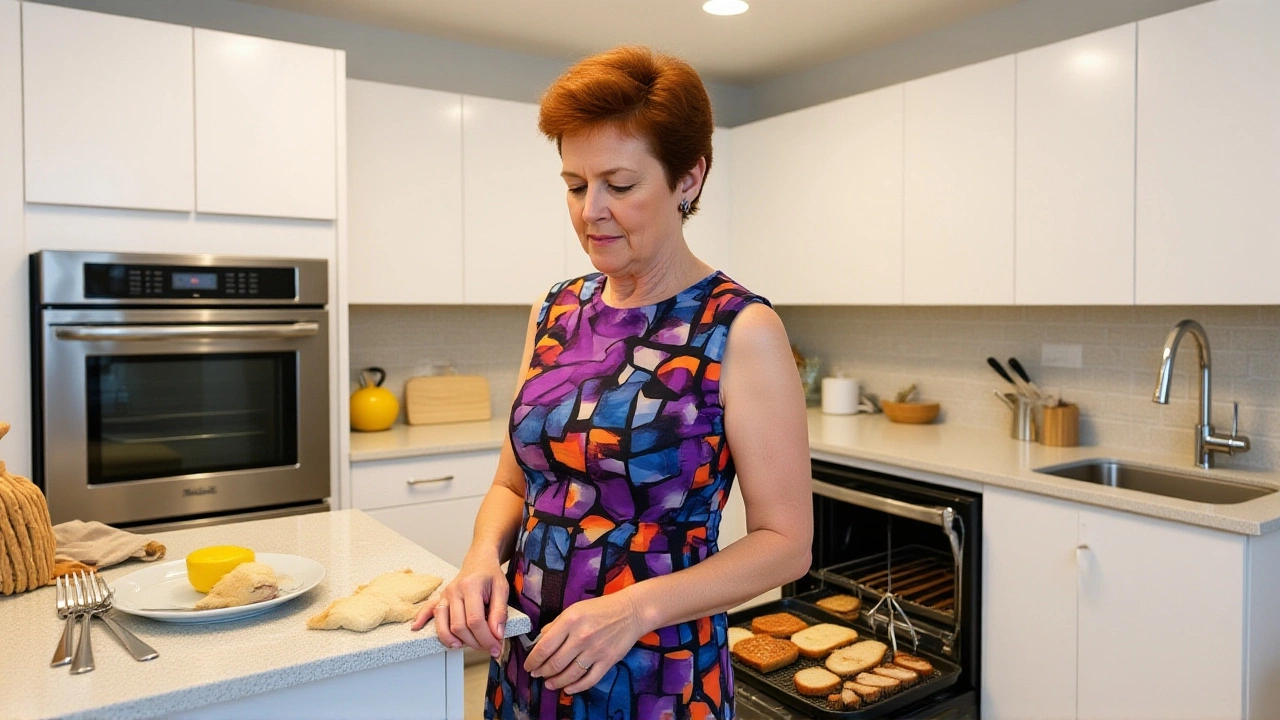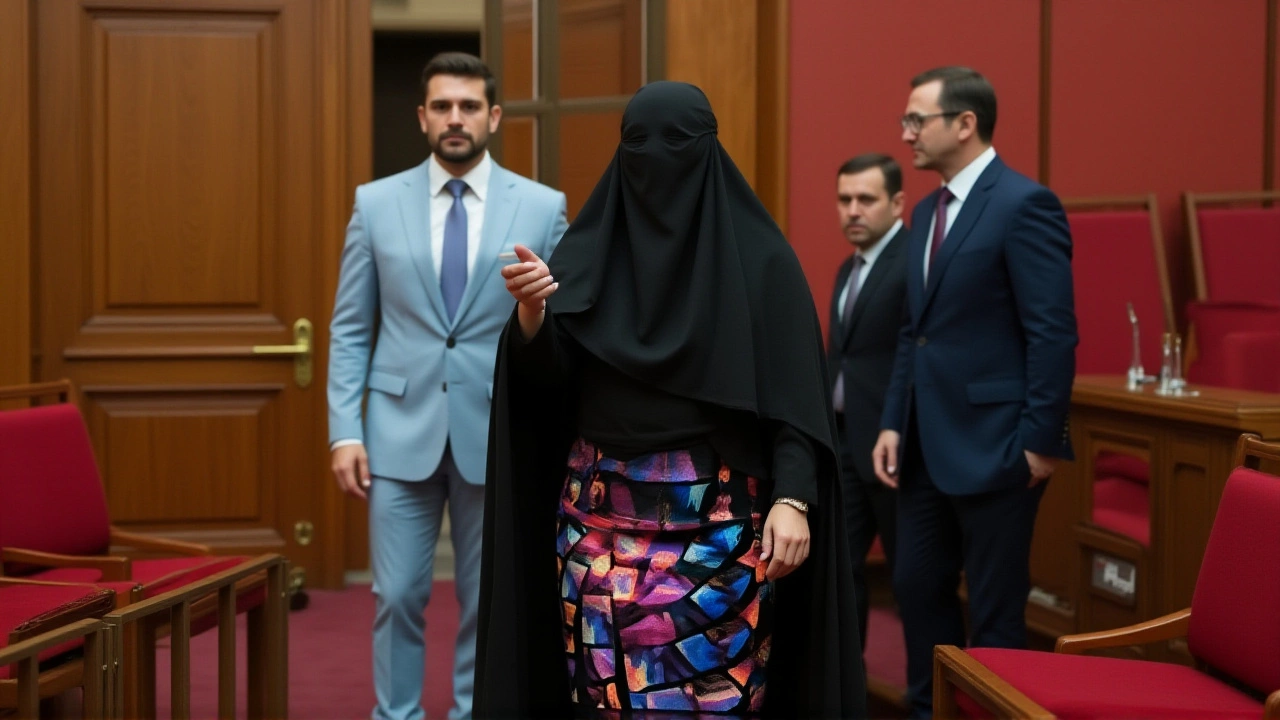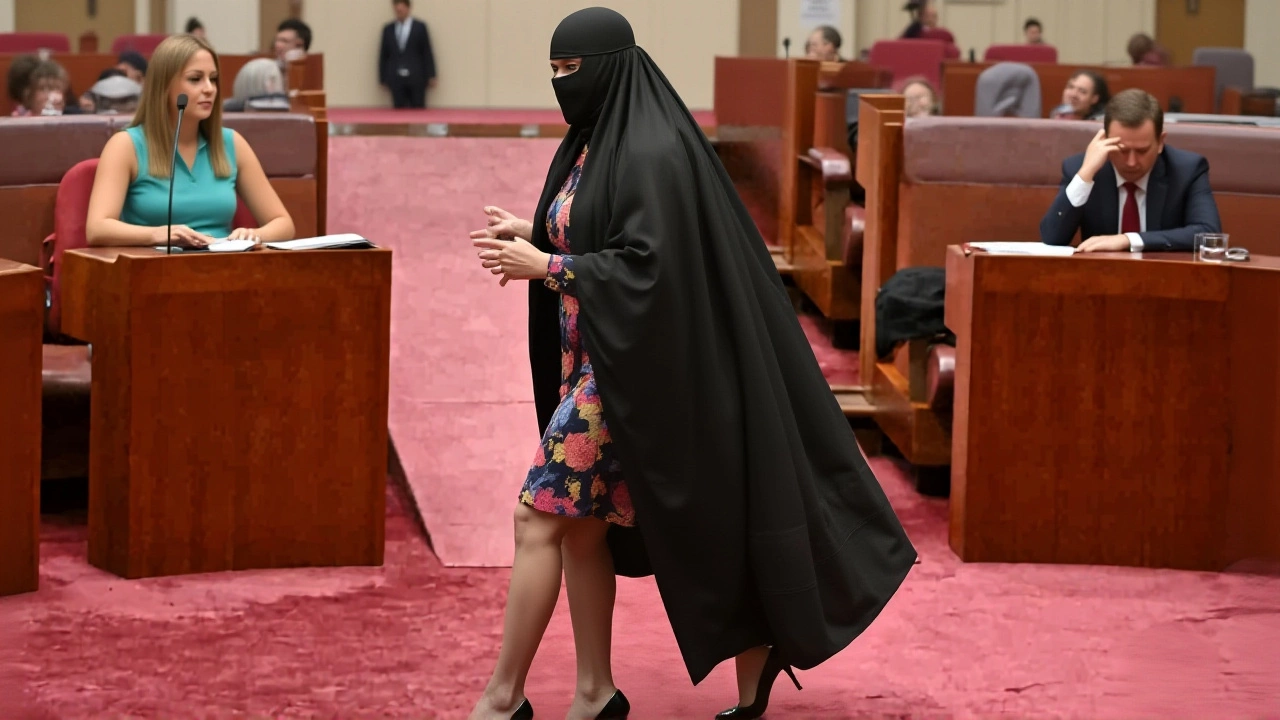On Monday, November 24, 2025, Pauline Lee Hanson, the 71-year-old leader of Pauline Hanson's One Nation and Senator for Queensland, walked into Australia’s Senate chamber wearing a full black burqa — a deliberate act of protest after her bill to ban face coverings in public was blocked from even being debated. The gesture, meant to spotlight what she called the "oppressive" nature of Islamic dress, triggered an immediate and furious backlash from Muslim lawmakers, triggering the suspension of parliamentary proceedings for over an hour. It was the second time in eight years Hanson had staged this stunt — the first, in 2017, drew similar condemnation. But this time, the outrage was louder, sharper, and more unified.
"This Is Blatant Racism"
Mehreen Faruqi, a Green Party Senator from New South Wales and Australia’s first Muslim woman in federal parliament, stood up immediately after Hanson entered the chamber. "This is a racist senator, displaying blatant racism," she declared, her voice steady but trembling with anger. Fatima Payman, an Independent Senator from Western Australia, called it "disgraceful" and "shame." Larissa Waters, leader of the Australian Greens in the Senate, didn’t hold back: "It’s the middle finger to people of faith. It’s not protest — it’s provocation. And it’s unsafe." Even Penny Wong, Australia’s Foreign Minister and Senate leader, broke protocol to speak. "All of us in this chamber have great privilege," she said, her tone colder than usual. "We come from every faith, every background. And we do so with dignity. This was disrespectful." Hanson, however, didn’t budge. When Senate officials asked her to remove the garment, she refused. The presiding officer, overwhelmed by the chaos, suspended proceedings — the first time in over a decade that Australia’s Senate halted business over a single senator’s protest.A Pattern, Not a One-Off
This wasn’t spontaneous. Hanson’s burqa stunt in 2017 was widely criticized by Muslim leaders, interfaith groups, and even some within her own party. Back then, she claimed she was raising "security concerns" — that the burqa hid identities and enabled radicalization. But critics noted: no Australian terrorist had ever used a burqa to commit violence. No court case had ever hinged on a woman’s face covering. The claim was always about symbolism, not safety. This time, the stakes felt higher. Pauline Hanson's One Nation has surged in polls, hitting 18% support — its highest ever — according to The Australian Financial Review. The surge comes amid fractures in the Liberal-National Coalition, with voters drifting toward Hanson’s hardline stance on immigration and multiculturalism. Her political survival now depends on stoking fear, not policy. The burqa, once a fringe issue, has become her signature prop. "If they don’t want me wearing it, ban the burqa," she wrote in a statement posted to her verified Facebook page. "More than 20 countries have banned it because it oppresses women, encourages radical Islam, and threatens social cohesion." She listed France, Belgium, Denmark, and Austria as examples — all European nations that have passed partial or full bans. But she left out the context: those bans were often tied to public safety laws, not religious discrimination. And in every case, they faced fierce legal and human rights challenges.
What’s Really at Stake?
The real issue isn’t the burqa. It’s who gets to define what’s "Australian." Hanson’s argument rests on a false equivalence: equating a religious garment with terrorism, oppression, and national threat. But Muslim women who wear the burqa — a tiny fraction of Australia’s 800,000 Muslims — often do so by choice. Many are converts. Others wear it for cultural or spiritual reasons. To reduce their identity to a security risk is not just wrong — it’s dehumanizing. "She doesn’t want to ban the burqa because it’s dangerous," said Dr. Aisha Rahman, a sociology professor at the University of Melbourne. "She wants to ban it because it makes non-Muslim Australians uncomfortable. And she’s weaponizing that discomfort to win votes." The Australian Human Rights Commission has received 147 complaints of anti-Muslim incidents since January 2024 — a 37% increase from the same period last year. While most are online harassment, the Senate incident gave legitimacy to the idea that Islamophobia is acceptable in public spaces. That’s dangerous.What Happens Next?
Hanson has vowed to wear the burqa every day the Senate sits — until her bill passes. That’s not going to happen. But her protest has already changed the conversation. Opposition parties are now being pressured to respond. Will they call it racism? Or will they tiptoe around it, fearing they’ll lose voters to One Nation? Legal experts say the Senate has the power to expel a member for disorderly conduct — but it’s never been done. The precedent would be explosive. Meanwhile, Muslim advocacy groups are planning a national day of solidarity: women of all faiths will wear headscarves, hijabs, and yes — burqas — in Parliament Square on December 10, Human Rights Day.
Why This Matters Beyond Australia
This isn’t just an Australian problem. Far-right politicians in Canada, Germany, and the U.S. have used similar tactics — wearing religious garments they claim to oppose, then blaming minorities for "making them do it." It’s a playbook: create outrage, frame yourself as the victim, then demand more power to "protect" the majority. Australia’s democracy is being tested. Not by extremists on the streets — but by one senator in a chamber built on civility. And if the system can’t respond without descending into chaos, what does that say about its resilience?Frequently Asked Questions
Why did Pauline Hanson wear a burqa in Parliament?
Hanson wore the burqa to protest the blocking of her bill to ban face coverings in public. She claimed it was to highlight what she described as the garment’s role in oppressing women and threatening national security. Critics say it was a performative act designed to provoke outrage and gain media attention, especially after her party’s polling surged to 18%.
How did Muslim lawmakers respond?
Muslim senators like Mehreen Faruqi and Fatima Payman condemned the act as racist and disgraceful. Faruqi called it "blatant racism," while Payman said it was "shame." Larissa Waters of the Greens labeled it "the middle finger to people of faith." Foreign Minister Penny Wong called it disrespectful, and the Senate suspended proceedings after Hanson refused to remove the garment.
Has this happened before in Australia’s Parliament?
Yes. In 2017, Hanson wore a burqa during a Senate session to make a similar point about security and oppression. That incident also drew widespread condemnation from Muslim communities and interfaith leaders. The 2025 protest was a deliberate replay — but this time, it triggered a parliamentary suspension, signaling a new level of disruption.
Are burqas banned in other countries, and why?
More than 20 countries, including France, Belgium, Austria, and Denmark, have passed laws restricting full-face coverings in public spaces. Most cite public safety, identification, or secularism as reasons. However, human rights groups argue these laws disproportionately target Muslim women and often lack evidence linking burqas to actual threats. In many cases, courts have struck them down as discriminatory.
What’s the impact on Australia’s Muslim community?
The incident has intensified fear and alienation among Australia’s 800,000 Muslims. Complaints of anti-Muslim hate have risen 37% since early 2024. Community leaders warn that such symbolic acts in Parliament normalize discrimination, making everyday life more hostile — from school bullying to workplace harassment. Many say they now feel like outsiders in their own country.
Could Hanson be expelled from the Senate?
Technically, yes. The Senate can expel a member for "disorderly conduct," but it’s never been done. Legal experts say Hanson’s actions may qualify, but political will is lacking. Expelling her would ignite a constitutional crisis and likely boost her support. For now, the system is stuck — responding with outrage, not action.
